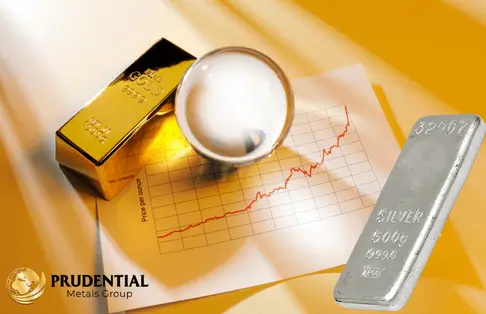Gold Futures Analysis
Analyzing the Recent Descent of Gold Futures
Perfect time to load up in Gold & Silver. In recent times, the Gold market has witnessed a significant event – the descent of Gold futures below the crucial $1900 per ounce threshold. This move marks a notable shift in the dynamics of precious metal trading, and understanding its implications is paramount for traders.
The descent below $1900/oz suggests that Gold, historically considered a safe haven asset, is not immune to market fluctuations. While it remains a valuable asset, its vulnerability to economic and geopolitical factors is evident. The potential consequences of this dip include increased market uncertainty, as investors reevaluate their portfolios and risk appetites.
Emphasizing Adaptability and Nimbleness
In light of these developments, one key lesson emerges: adaptability and nimbleness are essential qualities for precious metal traders. The ability to swiftly respond to changing market conditions and adjust trading strategies accordingly is invaluable.
For traders in the precious metals market, this means being prepared for both bullish and bearish scenarios. It requires monitoring economic indicators, geopolitical events, and central bank policies that can influence Gold prices. Staying informed and remaining flexible in your trading approach will allow you to capitalize on opportunities and minimize risks.
Highlighting the Year’s Significant Monthly Gains and Losses in Gold Prices
To gain a better understanding of Gold’s market dynamics, it’s essential to look at the year’s most significant monthly gains and losses in Gold prices. These fluctuations provide insights into the factors driving Gold’s price movements and can inform trading strategies.
For instance, the month-to-month price changes can reveal patterns related to economic events, inflation concerns, or shifts in investor sentiment. By identifying these patterns, traders can make more informed decisions about when to enter or exit the market.
In conclusion, the recent descent of Gold futures below $1900/oz underscores the need for adaptability and nimbleness in the precious metals market. Traders must stay vigilant, assess the potential consequences of market developments, and remain informed about the factors influencing Gold prices. By doing so, they can navigate the ever-changing landscape of precious metal trading with greater confidence and success.
Technical Analysis and Scaling In
Demystifying the Power of Technical Analysis
In the world of precious metal trading, understanding the intricacies of price movements is pivotal. This is where technical analysis steps in as a potent tool for traders seeking to decode the enigma of Silver’s price dynamics.
At its core, technical analysis involves the examination of historical price data, chart patterns, and various technical indicators to make informed predictions about future price movements. It helps traders identify trends, key support and resistance levels, and potential turning points in the market.
For Silver traders, this means harnessing the power of charts and indicators to gain insights into when to enter or exit positions. Whether it’s identifying a bullish trend or recognizing signs of a potential reversal, technical analysis empowers traders with valuable information to make informed decisions.
Scaling In with Dollar-Cost Averaging: A Cautious, Long-Term Approach
In a market as dynamic as precious metals, a cautious and long-term approach is often the key to success. This is where scaling in with dollar-cost averaging comes into play.
Scaling in involves gradually building a position in the Silver market over time. Instead of making a single large investment, traders allocate a fixed amount of capital at regular intervals. This approach mitigates the risks associated with market volatility and minimizes the impact of short-term price fluctuations.
Dollar-cost averaging offers a structured way to accumulate Silver holdings while reducing the emotional impact of market swings. It aligns with the principle of buying low and selling high, allowing traders to capitalize on Silver’s long-term potential.
The Gold/Silver Ratio and Calculated Risk with Bull Call Spreads
An essential aspect of precious metal trading is considering the Gold/Silver ratio—a key indicator that measures the relative value of Gold to Silver. Understanding this ratio can aid traders in making strategic decisions.
When the Gold/Silver ratio is high, it implies that Silver is relatively undervalued compared to Gold, potentially presenting a buying opportunity. Conversely, a low ratio may suggest that Silver is overvalued compared to Gold.
For traders seeking calculated risk strategies, bull call spreads can be a valuable tool. This involves buying call options with a lower strike price and simultaneously selling call options with a higher strike price. This strategy limits potential losses while allowing traders to benefit from upward price movements in Silver.
In essence, technical analysis, scaling in with dollar-cost averaging, and considering the Gold/Silver ratio are integral components of a well-rounded strategy for precious metal trading. By demystifying technical analysis, adopting a long-term approach, and employing calculated risk strategies, traders can navigate the intricacies of the Silver market with greater confidence and precision.
The Federal Reserve’s Role
Probing the Federal Reserve’s Influence on Precious Metal Prices
In the intricate web of global financial markets, the role of central banks is profound, and the United States Federal Reserve takes center stage. For precious metal traders, understanding the Federal Reserve’s monetary policies is paramount, as they exert a considerable influence on the prices of Silver and Gold.
The Federal Reserve’s decisions regarding interest rates, quantitative easing programs, and inflation targets directly impact the precious metal market. When interest rates are low and monetary policy accommodative, precious metals often become more attractive to investors seeking refuge from currency devaluation and inflation. Conversely, hawkish policies and rate hikes can exert downward pressure on precious metal prices.
Scrutinizing Recent Policy Changes and Their Market Effects
To comprehend the Federal Reserve’s influence, it’s essential to scrutinize its recent policy changes and their ripple effects in the precious metal market. For instance, analyzing decisions related to interest rate adjustments or shifts in the pace of asset purchases provides critical insights for traders.
Recent policy changes can trigger volatility in precious metal prices. A surprise rate hike, for example, may initially lead to a drop in Silver and Gold prices as investors pivot to higher-yielding assets. Conversely, dovish policy moves can buoy precious metal markets.
Offering the Prudential Metals Group’s Unique Perspective
Within this context, the author’s unique perspective comes into play. While the Federal Reserve’s role is a subject of widespread debate, the author offers their insights into how the institution has managed inflation and interest rates. This perspective can serve as a valuable guide for traders seeking to anticipate the central bank’s actions and their potential implications for precious metals.
The author’s perspective may encompass topics such as the timing of rate hikes, the Federal Reserve’s response to inflationary pressures, and its overall approach to economic stabilization. These insights provide readers with an additional layer of understanding, helping them navigate the complex relationship between central bank policies and precious metal markets.
Comprehending the Federal Reserve’s role in precious metal trading is essential for success in this market. By probing the central bank’s influence, scrutinizing recent policy changes, and considering the author’s unique perspective, traders can make more informed decisions and position themselves strategically in response to Federal Reserve actions and their consequences on precious metal prices.
Inflation Trends and the Fed’s Response
Presenting Inflation Trends from 2015 to 2023
Understanding inflation trends is pivotal for traders in the precious metals market, as inflation can significantly influence the prices of Silver and Gold. To provide readers with a comprehensive overview, we present a table illustrating inflation trends from 2015 to 2023
| Year | Inflation Rate (%) |
| 2015 | 0.1% |
| 2016 | 1.3% |
| 2017 | 2.1% |
| 2018 | 1.9% |
| 2019 | 2.3% |
| 2020 | 1.2% |
| 2021 | 7.0% |
| 2022 | 8.5% |
| 2023* | (Data Ongoing) |
Conducting an Incisive Analysis of the Federal Reserve’s Responses
The Federal Reserve’s response to mounting inflation rates is a critical aspect of the precious metal trading landscape. The table illustrates a gradual increase in inflation from 2015 to 2021, with a sharp spike in 2021 and 2022. To understand the Federal Reserve’s actions, we must analyze how it navigated this inflationary period.
During the initial years of low inflation, the Federal Reserve maintained accommodative monetary policies, keeping interest rates low to stimulate economic growth. However, as inflation began to surge in 2021 and 2022, the central bank faced a formidable challenge. Its response included the consideration of raising interest rates to combat inflation and maintain price stability
Critiquing the Timing and Effectiveness of Rate Hikes
Critiquing the timing and effectiveness of the Federal Reserve’s decisions regarding interest rate hikes is essential for traders in the precious metals market. The key questions to consider are:
Timing:
Did the Federal Reserve act swiftly enough in response to mounting inflation, or did it delay rate hikes until inflation reached more critical levels?
Effectiveness:
Were the rate hikes effective in curbing inflation, or did they have unintended consequences on the broader economy and financial markets?
Understanding the nuances of the Federal Reserve’s decision-making process and assessing the impact of its policies on inflation and precious metal prices is critical for traders. It allows them to anticipate potential market reactions and make informed decisions regarding their precious metal investments.
Tracking inflation trends and analyzing the Federal Reserve’s responses to inflation is an integral part of trading in precious metals. By presenting a comprehensive table, conducting an incisive analysis, and critiquing the timing and effectiveness of rate hikes, traders can gain valuable insights into the dynamics of inflation and the central bank’s role in shaping the precious metal market.
Navigating the Precious Metal Markets with Wisdom and Strategy
In the course of this article, we have embarked on a journey through the fascinating world of trading in precious metals, particularly Silver and Gold. Our exploration has illuminated several key facets of this intricate landscape, offering insights and strategies to help traders navigate with confidence. Here, we encapsulate the invaluable insights gleaned:
Trading Strategies and Market Dynamics:
We have uncovered the significance of astute trading strategies, emphasizing the timeless wisdom of buying low and selling high. The cautionary tale of Silver’s dramatic surge in 2011 serves as a poignant reminder of the importance of market timing and the psychological dimensions of trading during extremes of fear and optimism.
Crafting a Strategic Approach:
The inherent unpredictability of market crashes calls for a proactive approach. Our recommended strategy involves dollar-cost averaging with Silver futures, complemented by options overlays. Diversification through Gold, S&P put options, and Crude Oil calls during energy price upswings adds resilience to the portfolio. The possibility of 10-year Treasury calls during market turmoil offers an additional hedge.
Gold Futures Analysis:
Our analysis of Gold futures breaking below the $1900/oz threshold underscores the need for adaptability and nimbleness when entering or exiting the precious metals market. We have also highlighted the significant monthly gains and losses in Gold prices throughout the year, shedding light on the market’s evolving dynamics.
Technical Analysis and Scaling In:
Demystifying technical analysis as a powerful tool for understanding Silver’s price movements, we have recommended a cautious, long-term approach through scaling into the Silver market with dollar-cost averaging. The Gold/Silver ratio’s importance has been underscored, with bull call spreads proposed as a calculated risk strategy.
The Federal Reserve’s Role:
Our examination of the Federal Reserve’s influence on precious metal prices has revealed its profound impact through monetary policies. Recent policy changes have been scrutinized, and the author’s unique perspective on the central bank’s management of inflation and interest rates has been offered.
Inflation Trends and the Fed’s Response:
The comprehensive table outlining inflation trends from 2015 to 2023 has served as a valuable resource. An incisive analysis of the Federal Reserve’s responses to mounting inflation and a critique of the timing and effectiveness of rate hikes have deepened our understanding of its role in shaping the precious metal market.
Trading in precious metals is a dynamic endeavor that demands vigilance and a keen understanding of market dynamics and economic forces. As we navigate these captivating markets, it is imperative to remain adaptable and well-informed. We encourage readers to adapt swiftly to evolving market conditions, armed with the strategies and insights shared in this article. Furthermore, we recommend leveraging educational resources to cultivate a deeper understanding of the precious metal trading landscape. By doing so, traders can embark on their own successful journeys through the world of precious metals, equipped with knowledge, strategy, and the ability to make informed decisions in pursuit of their financial goals.
Recommend For You !!













